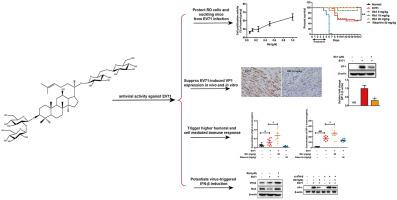Journal of Ethnopharmacology ( IF 4.8 ) Pub Date : 2020-09-25 , DOI: 10.1016/j.jep.2020.113401 Naixin Kang , Hongwei Gao , Luan He , Yanli Liu , Handong Fan , Qiongming Xu , Shilin Yang

|
Ethnopharmacological relevance
According to the theory of traditional Chinese medicine, the main pathogenesis of severe hand, foot and mouth disease (HFMD) is that the heat and wet poisons are deeply trapped in the viscera, which causes the deficiency of Qi and Yin in the patient's body. Ginsenoside Rb1 (Rb1) is the most abundant triterpenoid saponin in Panax quinquefolius L., which has the function of Qi-invigorating and Yin-nourishing. Enterovirus 71 (EV71) is one of the causative pathogens of HFMD, especially the form associated with some lethal complications. Therefore, the therapeutic effect of Rb1 on this disease caused by EV71 infection is worth exploring.
Aim of the study
We explored the effective antiviral activities of Rb1 against EV71 in vitro and in vivo and investigated its preliminary antiviral mechanisms.
Material and methods
EV71-infected two-day-old suckling mice model was employed to detect the antiviral effects of Rb1 in vivo. To detect the antiviral effects of Rb1 in vitro, cytopathic effect (CPE) reduction assay was performed in EV71-infected Rhabdomyosarcoma (RD) cells. Interferon (IFN)-β interference experiment was employed to detect the antiviral mechanism of Rb1.
Results
In this paper, we first found that Rb1 exhibited strong antiviral activities in EV71-infected suckling mice when compared to those of ribavirin. Administration of Rb1 reduced the CPE of EV71-infected RD cells in a dose-dependent manner. Moreover, EV71-induced viral protein-1 (VP-1) expression was significantly reduced by Rb1 administration in vitro and in vivo. Furthermore, Rb1 treatment could induce high cellular and humoral immune responses in vivo. Meanwhile, Rb1 contributed to the enhanced Type I IFN responses and IFN-β knockdown reversed the antiviral activity of Rb1 in vitro.
Conclusion
In summary, our findings suggest that Rb1 is an immune-stimulatory agent and provide an insight into therapeutic potentials of Rb1 for the treatment of EV71 infection.
中文翻译:

人参皂甙Rb1是一种免疫刺激剂,具有抗肠道病毒的抗病毒活性71
民族药理学意义
根据中医理论,严重的手足口病(HFMD)的主要发病机制是内脏深陷热毒和湿毒,这会导致患者体内气虚和阴虚。人参皂苷Rb1(Rb1)是西洋参中含量最丰富的三萜皂苷,具有补气养阴的功能。肠病毒71(EV71)是手足口病的病原体之一,特别是与一些致命并发症相关的形式。因此,Rb1对这种由EV71感染引起的疾病的治疗效果值得探讨。
研究目的
我们探索了Rb1在体外和体内对EV71的有效抗病毒活性,并研究了其初步的抗病毒机制。
材料与方法
用EV71感染的两天大的乳鼠模型来检测Rb1在体内的抗病毒作用。为了检测Rb1的体外抗病毒作用,在EV71感染的横纹肌肉瘤(RD)细胞中进行了细胞病变效应(CPE)降低测定。干扰素(IFN)-β干扰实验用于检测Rb1的抗病毒机制。
结果
在本文中,我们首先发现,与利巴韦林相比,Rb1在EV71感染的乳鼠中表现出强大的抗病毒活性。Rb1的给药以剂量依赖性方式降低了被EV71感染的RD细胞的CPE。此外,通过在体外和体内施用Rb1,EV71诱导的病毒蛋白1(VP-1)表达显着降低。此外,Rb1治疗可在体内诱导高细胞和体液免疫反应。同时,Rb1有助于增强I型IFN反应,而IFN-β敲低则逆转了Rb1的体外抗病毒活性。
结论
总而言之,我们的发现表明Rb1是一种免疫刺激剂,可深入了解Rb1在治疗EV71感染方面的治疗潜力。




















































 京公网安备 11010802027423号
京公网安备 11010802027423号